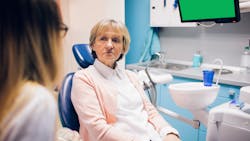Oral health and menopause: 84% of women unaware of connection
Findings of a recent study of women 50 and older show that 84% are not aware of the potential impact of menopause on their oral health, even as 79% say they’ve noticed a change in their teeth and gums as they age.
Among the results of Delta Dental’s study called “Breaking the stigma: Let’s talk about menopause and oral health,” which surveyed more than 1,000 women, 70% of respondents who’ve started experiencing menopausal symptoms have noticed certain oral health symptoms but didn’t associate the symptoms with hormonal changes.
For example, while 39% said they experienced xerostomia, 77% were not aware dry mouth can be connected to menopause, according to a press release on the study. In “Midlife transitions and oral health” on RDH, a DentistryIQ sister site, author Anne Rice, BS, RDH, CDP, FAAOSH, notes that “The most significant oral discomfort in women going through menopause is oral dryness or xerostomia. Some women also complain of burning mouth syndrome and altered taste buds.”
Lack of awareness was even higher among other symptoms, including increased tooth decay and risk of gum disease, tooth loss, and receding gumlines.
Notable survey findings from respondents include:
- 27% say they can’t find information or resources regarding menopause-related oral health concerns.
- 70% say they regret not taking better care of their teeth and gums when younger.
- 84% say there should be more resources that provide information about the link between menopause and overall health.
The role of health-care professionals
While 38% of women surveyed have discussed menopause concerns with a primary care provider, that percentage drops to just 2% and 1% respectively for women who say they’ve talked about menopause with their dentist or dental hygienist.
"What's most compelling to me is how few menopausal women said they had asked any physician about oral health symptoms," says Dr. Jessica Buehler, senior director of dental affairs at Delta Dental, in the press release. "That's a care gap with extensive repercussions— saliva is the natural buffer of your mouth, and less saliva means less protection against dry mouth, which is at the crux of all other oral health symptoms related to menopause, like burning tongue, increased tooth decay and altered taste."
As such, Buehler encourages pre-, peri-, post- or menopausal women to share their oral health changes with their dental providers, advising those who feel uncomfortable to "focus on simply sharing the oral health symptoms that you're experiencing."
As for providers, “Women’s hormones and their effects can mark oral health transformations that clinicians need to know to differentiate treatment and recommendations. Six thousand women enter menopause every day—that’s two million per year,” says Rice. “I would suspect there are a few in your practice, or perhaps in your own family, who would benefit from a greater understanding of their systemic health.”
About the Author
Elizabeth S. Leaver
Digital content manager
Elizabeth S. Leaver was the digital content manager for Endeavor Business Media's dental group from 2021-2024. She has a degree in journalism from Northeastern University in Boston and many years of experience working in niche industries specializing in creating content, editing, content marketing, and publishing digital and magazine content. She lives in the Boston area.
